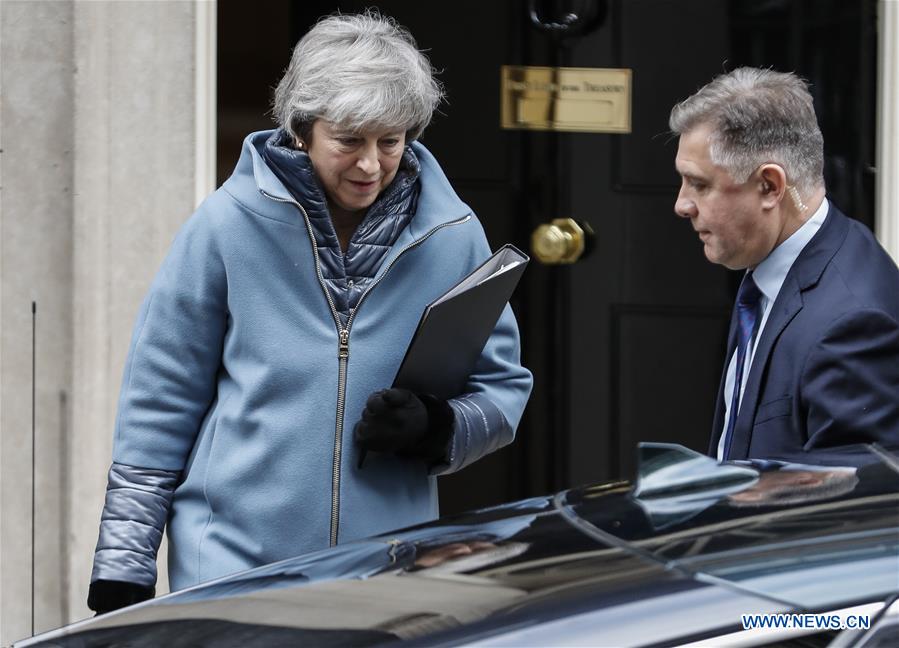


British Prime Minister Theresa May (L) leaves 10 Downing Street to make a statement to the House of Commons to update on Brexit talks in London, Britain, Feb. 12, 2019. (Xinhua/Han Yan)
LONDON, Feb. 12 (Xinhua) -- British lawmakers are unlikely to get a vote on a Brexit deal until just four weeks before Britain's planned exit from the European Union (EU), British Prime Minister Theresa May said Tuesday.
Addressing MPs in the House of Commons, May said she was not yet ready to put an alternative Brexit deal before parliament, saying it may take time to get a revised deal from Brussels.
May went to Brussels last week in an attempt to secure changes to the so-called backstop arrangement designed to avoid border checks between Northern Ireland and the Republic of Ireland.
As expected, the European Commission President Jean-Claude Juncker said the EU would not reopen the withdrawal agreement agreed between the British government and Brussels.
The backstop arrangement is considered by some Brits -- especially Brexiteers -- to be a trap to retain Britain in a customs union with the EU and pragmatically delay their "divorce."
However, May said both sides agreed their officials would continue talks on a Brexit deal. "It may take time to get a revised deal," May told the Commons.
May said she will present an amendable Brexit motion for debate in the House of Commons on Thursday, giving politicians a chance to challenge her Brexit process and put forward alternatives.
"But if there is no deal by Feb. 26, the government will make a statement to MPs on that day, and hold a debate on an amendable motion on Feb. 27," said May.
"Talks are now at a crucial stage and we must all hold our nerve," May said, adding she believes Britain can reach a deal that will have the support of Parliament, and also honor the result of the 2016 referendum when British votes backed leaving the EU.
"When we achieve the progress we need, we will bring forward another meaningful vote," said May.
May also told MPs she rejected a proposal put forward by the main opposition Labour party for Britain to join an EU customs union.
Responding to May, Labour leader Jeremy Corbyn said Britain was facing the biggest crisis in its history, accusing her of playing for time to win backing for her Brexit deal by running down the clock towards the Brexit day on March 29.

 Award-winning photos show poverty reduction achievements in NE China's Jilin province
Award-winning photos show poverty reduction achievements in NE China's Jilin province People dance to greet advent of New Year in Ameiqituo Town, Guizhou
People dance to greet advent of New Year in Ameiqituo Town, Guizhou Fire brigade in Shanghai holds group wedding
Fire brigade in Shanghai holds group wedding Tourists enjoy ice sculptures in Datan Town, north China
Tourists enjoy ice sculptures in Datan Town, north China Sunset scenery of Dayan Pagoda in Xi'an
Sunset scenery of Dayan Pagoda in Xi'an Tourists have fun at scenic spot in Nanlong Town, NW China
Tourists have fun at scenic spot in Nanlong Town, NW China Harbin attracts tourists by making best use of ice in winter
Harbin attracts tourists by making best use of ice in winter In pics: FIS Alpine Ski Women's World Cup Slalom
In pics: FIS Alpine Ski Women's World Cup Slalom Black-necked cranes rest at reservoir in Lhunzhub County, Lhasa
Black-necked cranes rest at reservoir in Lhunzhub County, Lhasa China's FAST telescope will be available to foreign scientists in April
China's FAST telescope will be available to foreign scientists in April